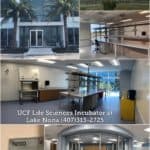 A new Life Sciences Incubator has made its way into the GuideWell Innovation Center located in Lake Nona’s Medical City. The grand opening for this biosafety wet lab facility will be held on May 10.
A new Life Sciences Incubator has made its way into the GuideWell Innovation Center located in Lake Nona’s Medical City. The grand opening for this biosafety wet lab facility will be held on May 10.
Executive director of the UCF Business Incubation Program (UCFBIP), Dr. Thomas O’Neal, says $4 million went into the actual build-up of the facility while a little over $1 million was geared toward equipment. He hopes the creation of the incubator will drum up new business in the area and produce new jobs for people.
Since UCF’s College of Medicine is also located in Medical City, there is an intention that the Burnett School of Biomedical Sciences could produce leads for the incubator. Researchers will conduct their experiments and studies at the facility. “Well it’s not going to be a place where they develop a new app or how to turn on your water heater, this is about deep life sciences where you have to have these special kinds of conditions,” states O’Neal. Discoveries such as new proteins, vaccines, updated cancer treatments and drug development can be expected to take place in the setting. The goal is to create commercial products that can ultimately aid humanity.
The original funding for the project came from the state of Florida and was then sent to the city of Orlando. O’Neal says there is $1 million alone in specialized air handling for the building. It is a sanitary place with clean air. Everything from the ground up is designed to support a wet lab incubator. The lab was in the making for about three years in terms of ideas and rough draft designs until it actually broke ground in 2016.
Based on the UCF Life Sciences Incubator floor plan, some features include seven private wet labs, five private small offices, a collaborative space, and two conference rooms. For the seasoned scientist, equipment ranges from a flammable storage cabinet to a “Follet Nugget Icemaker,” as mentioned in the floor plan.
Besides being a new startup life sciences company, there is also a course one must go through to make sure they are an appropriate candidate for incubation.
Operating and marketing coordinator of UCFBIP, Robin Wright, mentions two companies have already moved in. One company, Aviana Molecular Technologies, is currently chipping away at a cure for lyme disease while the other company, SynapCyte, is working toward the treatment of Parkinson’s and Alzheimer’s.
It is true that UCF has its own research labs on campus, but those are mostly reserved for faculty and the federal government funded projects that are conducted there. O’Neal suggests that it is ideal to separate those types of studies from the studies that would go towards cooking up commercial products.
For the time being, this is the first and only wet lab of its kind in Central Florida. The UCFBIP would like to extend its growth in the future and open up more areas like the Life Sciences Incubator in other locations throughout the community.
For research companies who have inquiries on leasing building space, contact the UCF Life Sciences Incubator at LNincubatorinfo@ucf.edu or (407) 313-2725.


